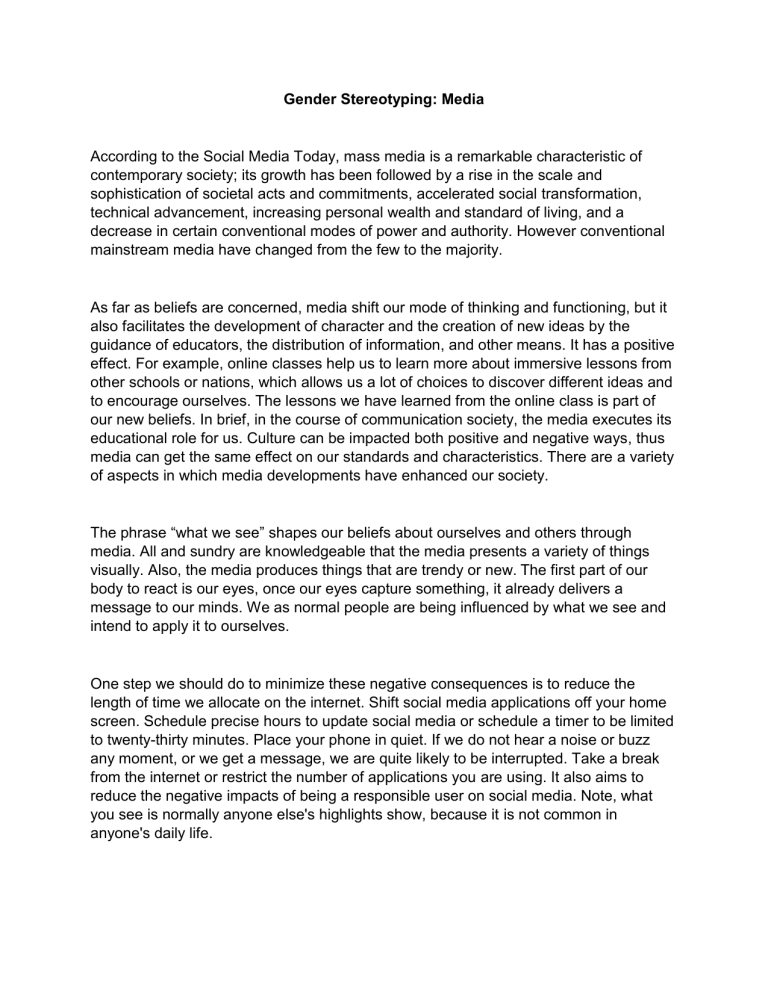
Gender Stereotyping: Media According to the Social Media Today, mass media is a remarkable characteristic of contemporary society; its growth has been followed by a rise in the scale and sophistication of societal acts and commitments, accelerated social transformation, technical advancement, increasing personal wealth and standard of living, and a decrease in certain conventional modes of power and authority. However conventional mainstream media have changed from the few to the majority. As far as beliefs are concerned, media shift our mode of thinking and functioning, but it also facilitates the development of character and the creation of new ideas by the guidance of educators, the distribution of information, and other means. It has a positive effect. For example, online classes help us to learn more about immersive lessons from other schools or nations, which allows us a lot of choices to discover different ideas and to encourage ourselves. The lessons we have learned from the online class is part of our new beliefs. In brief, in the course of communication society, the media executes its educational role for us. Culture can be impacted both positive and negative ways, thus media can get the same effect on our standards and characteristics. There are a variety of aspects in which media developments have enhanced our society. The phrase “what we see” shapes our beliefs about ourselves and others through media. All and sundry are knowledgeable that the media presents a variety of things visually. Also, the media produces things that are trendy or new. The first part of our body to react is our eyes, once our eyes capture something, it already delivers a message to our minds. We as normal people are being influenced by what we see and intend to apply it to ourselves. One step we should do to minimize these negative consequences is to reduce the length of time we allocate on the internet. Shift social media applications off your home screen. Schedule precise hours to update social media or schedule a timer to be limited to twenty-thirty minutes. Place your phone in quiet. If we do not hear a noise or buzz any moment, or we get a message, we are quite likely to be interrupted. Take a break from the internet or restrict the number of applications you are using. It also aims to reduce the negative impacts of being a responsible user on social media. Note, what you see is normally anyone else's highlights show, because it is not common in anyone's daily life. The trend that is emerging in modern media and entertainment is the objectification of women in public. Especially in films, music videos, literature, and advertisements, there is a massive emphasis on women as sexual objects. This is harmful to society because the media is generating gender stereotypes about both men and women which can lead to unhealthful social and physical behaviors. The problem is highly prominent because the more women's pornographic imagery is used by the media, the more people tend to buy into it. As a result, the media will influence the culture's view of dating, romance, sex, and what is “ideal” in society. The sexual preferences of society are influenced and have consequences that can influence all dimensions of society. This media activity is permitted to continue because the sale of pornography and the objectification of women is what culture has shown it needs to see in the modern media. Gender stereotypes can be positive or negative. For example, the saying "Gay men are naturally fashionable.", has a positive effect which is the stereotype tends to be strongly linked to media. The coverage may emphasize gay men in fashion since it is assumed that gay men are "typically" androgynous and thus more likely to think about clothing "as a woman would." The complexities of gay culture have changed significantly over the last fifty years whilst the negative effect is that not all gay men are stylish, much like not all heterosexual men groom or smoke cigarettes or hunt. This kind of stereotype can lead a gay man to deal with how he can show himself to everyone else. The tradition of measuring a book by its cover should be discarded, wherever it can be seen. We should want, as much as appropriate, to consider people in the way they want to show themselves, according to their premises and in their way. In the documentation “Miss Representation”, I learned that we are getting fed up with the media. We always want to be what we usually see from media and forget the reality. The media is very powerful that it can affect us that easily. The part from the documentation that stood up to me is the way the media objectifies women and the way they represent things very different from reality. The huge contradictions that I see in the media are that women who are being represented in the media are thinner and looking like an anorexic person which is called sexy and hot while real girls do not look like that, real girls have flaws and imperfections. It is claimed that it is simply the opinions of the establishments, but for the viewer to understand and interact with the content of the media, creators have to use stereotypes thus it is this perception of the audience that will be recognized. Perhaps that is why stereotyping is being used in a wide variety of media. In comparison, the media utilizes stereotyping because it produces more income. Nevertheless, more and more unusual elements are being incorporated into texts to provide a more modern portrayal of the youth of stereotypes in total. However, with the dominance of these establishments, stereotypes will still play a large role in the content of the media. If I will be given a chance to change the way media does business, I will create my own beauty business and promote it using the real concepts of men and women. I can post my products with a caption of truthfulness and I will use real men and women to model my products. In this way, young girls will not be insecure because what they see in the media is all reality and will encourage everyone to love the way they are. In conclusion, the trend of women's objectification in the media continues to endure because it is lucrative and amusing. Conversely, for physical and mental purposes, this media activity is detrimental to society. Men and women are left struggling to refine their appearances just as the media portray the 'ideal body,' but at the cost of their overall health. Men and women are threatened with depression and eating disorders linked to the portrayal of beauty in the media. The problem of women's objectification is also being perceived by younger generations across time. In our society, it is not desirable to feel inferior or dysfunctional because of the portrayal of women in the media, but that is what is happening. It is therefore fair to think of the rise in pornographic exposure and its proliferation in society as a factor in the growth in sexually transmitted infections, earlier and unintended pregnancy, and intensified sexual abuse.



![-----Original Message----- [mailto:] Sent: Tuesday, March 15, 2005 4:00 PM](http://s2.studylib.net/store/data/015587023_1-54e94fc602323868fe7d0334a40d4ded-300x300.png)